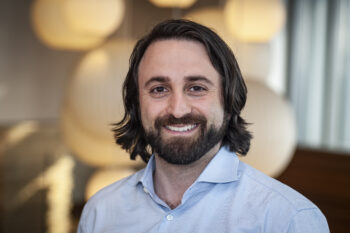
Seattle Children’s Therapeutics has launched BrainChild-04, a first-in-human phase 1 clinical trial that will be our first chimeric antigen receptor (CAR) T-cell clinical trial that targets four antigens at the same time, by delivering CAR T cells directly to the brain.
The trial is for children, teens, and young adults with diffuse intrinsic pontine glioma (DIPG), diffuse midline glioma (DMG), and other recurrent or refractory brain and spinal cord tumors.
“We believe this is the first CAR T-cell product in the world to target four antigens at the same time,” said Dr. Nicholas Vitanza, a neuro-oncologist at Seattle Children’s and the study chair for BrainChild-04.
CAR T-cell immunotherapy is an experimental treatment that stimulates the immune system to fight disease. The treatment reprograms T cells (white blood cells in the immune system that fight disease) to engage and kill cancer cells.
Five years ago, researchers had never delivered CAR T cells directly to a child’s brain. Today, research at Seattle Children’s is showing that it’s both possible and tolerable. More than 400 intracranial doses have been delivered to children, teens, and young adults enrolled in the BrainChild clinical trials (BrainChild-01, BrainChild-02, and BrainChild-03) to date.
Respectively, the first three BrainChild trials have individually targeted three of the four antigens (B7-H3, EGFR806, HER2, and IL13-zetakine) that will now be collectively targeted in BrainChild-04.
About 5,000 kids are diagnosed with brain tumors or spinal cord tumors each year in the US. These tumors, collectively, are also known as central nervous system (CNS) tumors.
DIPG and DMG are childhood tumors for which there is no known cure. Most children are diagnosed around age 6 or 7, and the average survival after diagnosis is only 11 months. Surgery is not an option for these tumors due to their sensitive location in the brain.
Other CNS tumors included in this study carry a very poor prognosis with very limited survival.
Each one of the first three BrainChild trials targeted a single antigen, which means the CAR T cells are directed at just one molecule on top of cancer cells, said Vitanza .
One of the challenges in treating pediatric CNS tumors, Vitanza said, is that they are heterogeneous, meaning that they have different landscapes on their surface so likely require targeting more than one antigen to reach a cure.
“That’s directly what we’re addressing here,” he said. “We knew we would need to get to a CAR T-cell trial that could target more than one thing at a time, and the strategy was if we showed safety with the three different antigens targeted throughout the first three BrainChild trials, coupled with the existing adult data on the fourth antigen, we could initiate a CAR T-cell clinical trial that targets all four.”
One key goal for BrainChild-04, Vitanza said, is to research whether it’s safe to target more than one antigen at the same time.
“At Seattle Children’s, we have a platform of what we’re trying to do, where we can build next generations on top of the feasibility and tolerability success that we already have from the first three BrainChild trials,” said Vitanza. “We are completing the first phase of what intracranial CAR T cells can do for children with brain and spinal cord tumors. Now, beyond the feasibility and safety of targeting one surface marker at a time, we can move to phase 2 using CAR T cells that can target more than one marker at a time,” he said.
Vitanza also said that the multi-antigen targeting trial will provide new insights that the single-antigen trials could not provide.
“Our number one priority is to take the best care possible of the patient we are treating and do our best to provide effective treatments against their disease, but this multi-antigen targeting trial will also give us new information about how tumors evolve when you are targeting so many things at a time,” said Vitanza. “If the tumor survives, then how? What does it become? If we need to target something else, what is it and when is the best time to target it?” he added.
The first three patients who enroll in BrainChild-04 must be age 12 or older. After that, the study will open for enrollment for children, teens and young adults ages 1 through 26.
Seattle Children’s has one of the largest pediatric cellular immunotherapy programs in the world. Since 2012, the Seattle Children’s Therapeutics team has designed, manufactured, and launched a robust portfolio of cellular immunotherapy clinical trials for childhood cancer in the areas of leukemia, lymphoma, brain and spinal cord tumors, and solid tumors.
The organization also recently announced the enrollment of its 500th patient in its CAR T-cell immunotherapy clinical trials, a major milestone in one decade.
Resources
- DIPG Research Program
- Brain Tumors
- Leukemia and Lymphoma Program
- Seattle Children’s Therapeutics (seattlechildrens.org)
- Seattle Children’s Cancer and Blood Disorders Center
- Solid Tumor Program
- ClinicalTrials.gov – Brain Child-04
- T-Cell Immunotherapy Overview (seattlechildrens.org)
- On the Pulse – Seattle Children’s Therapeutics Marks Milestone

